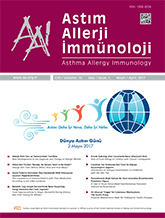


Objective: Even though asthma patients receive their treatment under a physician`s follow-up, there are many problems with asthma control and medicine usage due to the patients` incorrect expression of their symptoms and lack of asthma education. Patients are treated with a higher level of treatment to prevent possible exacerbations. The purpose of our study was to detect if the patient treatment was well-adjusted to the GINA guideline.
Materials and Methods: 101 asthmatic patients older than 18 years were enrolled. Demographic data, BMI (Body Mass Index), symptoms, comorbidities, medications, exacerbation risk factors and pulmonary function tests were recorded. The Asthma Control Test, SF-36 for life quality assessment and the Morisky Medication Adherence Scale were used.
Results: Of the 101 patients, 43 were male and 58 female. Based on the ACT results, 59.4% of the cases was under control. As per Morisky-8, 31.86% of the cases were in high alignment. Controlled asthma level was higher in males (p=0.037). When ACT scores were compared with asthma control levels, a significant difference was detected in ACT scores between under controlled group and the other cases (p=<0.001). Asthma control levels and FEV1 were correlated (p=<0.001). SF-36 levels were higher in controlled and partially controlled asthma patients (p=0.037). A substantial relationship of poor asthma control with comorbid `rhinitis` and `ischemic hypertensive heart disease` was found (p=0.048, p=0.035). ACT scores were significantly lower in patients with rhinosinusitis (p=0.025). Only 20 of the 101 cases (19.8%) received appropriate treatment. There was a significant difference between the treatment they should receive and their asthma control levels (p<0.001). While comparing asthma control levels and the received treatment, we observed a statistical significance (p=0.004).
Conclusion: Asthma education and awareness are essential for both the patients and the caregivers. The compliance of the patient with the prescribed medicine and the proper use of the medication should be sought out and comorbidities must be scrutinized.